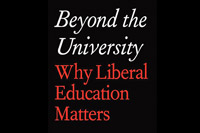FIVE QUESTIONS FOR EMY MATESAN
Emy Matesan, assistant professor of government at Wesleyan, focuses on Middle East politics, particularly security and political violence, democratization, and Islamist movements. In Egypt and Indonesia, Matesan conducted National Science Foundation-supported fieldwork exploring why groups adopt or abandon violence.
1. In the wake of the attack in Manchester, England, what have we learned about ISIS and its strategy? What does ISIS gain by attacks such as this (whether or not ISIS is actually responsible for this one)?
EM: ISIS has been fighting on two fronts. The main front from the beginning has been in Iraq and Syria, but as the group is starting to be militarily weakened and the appeal of the caliphate is losing steam, ISIS is increasingly focusing on a second front: inspiring attacks in the West.
Instead of a central decision-making process and direct coordination from its core leadership, now ISIS is shifting towards focusing on propaganda that can inspire individuals to stage attacks, or it is relying on handlers and a loose network of supporters to encourage acts of violence. In this sense, the Manchester attack confirms that ISIS is now developing a decentralized global network in a similar way to Al Qaeda. As the group is becoming weaker on the main front, staging high-profile attacks becomes an important element of propaganda that signals resilience and global reach. This is no longer about building an actual state, but about maintaining its reputation and projecting power and resolve. The Manchester attack fits perfectly with this logic, and the intentional targeting of teens only increased its shock value.
2. You’ve written about social movement theory. Briefly, what does this theory say about how ISIS frames its public messages?
EM: Social movement theory argues that groups are very strategic in what kind of messages they deploy, and that they are acutely aware of what can resonate with their audiences. ISIS has a gargantuan propaganda machine in multiple languages, and it customizes its messages depending on the audience, capitalizing on whatever grievances are most salient for a particular community or locality. For instance, there has been some reporting that before the recent attacks in Iran, ISIS had been increasing its Farsi propaganda and calling on the Iranian Sunni minority to revolt against the Shia regime.
3. You’ve also written about the limitations of military power in fighting ISIS. What, in your view, should be the elements of a comprehensive strategy to degrade ISIS?
EM: At home, the main options are hardening targets and strengthening intelligence. But if ISIS is not coordinating attacks, and only inspiring them, it becomes almost impossible to fully eliminate the risk of individuals resorting to violence. We see that very well with gun violence in the United States, which kills significantly more individuals than so-called lone-wolf terrorism ever will. What you can do is to respond much more effectively to reports from the community and minimize the access to lethal weapons. My fear is that in the current political climate we might see a spike in violence from hate groups and from people motivated by the fear of ISIS, perhaps even more so than attacks by ISIS-inspired individuals. I think the discussion around reducing violence needs to be much broader than simply fighting ISIS.
In Iraq and Syria, a military campaign against ISIS can weaken the organization, but it cannot kill the idea of the Islamic State, nor does it address the reasons for armed action. Organizations can be militarily defeated and even disappear for a while, but if the underlying grievances and motivations persist, it is usually only a matter of time before they metamorphose into new entities or emerge in different areas. If you want to pull the rug out from under ISIS in Syria, you have to work toward the resolution of the civil war, and you have to be willing to engage and negotiate with all types of armed actors. The strength and appeal of ISIS depend not only on its military capabilities and propaganda but also on the strength and perceived legitimacy of its competition and opponents. Many armed groups in Syria are willing to demobilize if the regime is removed, but they have to have credible exit options from violence, and they have to be offered security guarantees—in other words, they need to know that if they give up their arms they will not be killed by their opponents, and fighters will have to be reintegrated in society.
In my research I find that the leadership of a group can play a critical role not only in staging armed attacks but also in driving a group to demilitarize and denounce violence. You may weaken an armed group and temporarily reduce the threat of terrorism, but in my view the real victory is if the group revises its ideology and actively promotes nonviolent alternatives. I am not suggesting that ISIS currently has leaders willing to undertake such revisions, but focusing solely on decapitation and destruction certainly eliminates any such possibility in the future.
4. To what extent is Israeli– Palestinian conflict fuel for ISIS, versus other sources?
EM: The Israeli–Palestinian conflict is a highly resonant issue for many audiences, and in a vague way it has also come up in some of the ISIS poetry and propaganda, but mainly as one of the many grievances and injustices facing the global Muslim community. Unlike Al Qaeda, for instance, in whose rhetoric this conflict featured prominently, for ISIS the main issue has never been the Israeli– Palestinian conflict. From the very beginning, ISIS has been about the war in Iraq and the conflict in Syria.
5. What can the U.S. and its allies do to reduce the level of instability and conflict in the Middle East?
EM: This is an interesting question that seems to assume that it is either America’s responsibility or in America’s national interest to reduce conflict in the Middle East. There are plenty of people who would disagree with both of those assumptions. On the question of responsibility, you have, on one hand, growing levels of war fatigue and rising support for isolationism among many Americans, and, on the other hand, you also have many people around the world who perceive America’s intervention in the Middle East as a neo-imperialist form of meddling that amounts to a hypocritical and ultimately solely self-serving foreign policy. Is it in America’s interest to solve the conflicts in the Middle East? To some extent yes, because conflict can spread and weaken allies, disturb global markets, and breed terrorism. But most conflicts in the Middle East do not pose an existential threat to the United States, and in some cases, to solve the problems might mean compromising America’s alliances and economic interests.
This being said, the U.S. could play an important role in solving conflicts if it shifted its priorities and some of its approaches, so that it would emphasize human security, development, and sustainability. We could also push much more rigorously for negotiations; invest more resources in peacekeeping and stability operations; and work much more closely with the U.N. and with international organizations.



